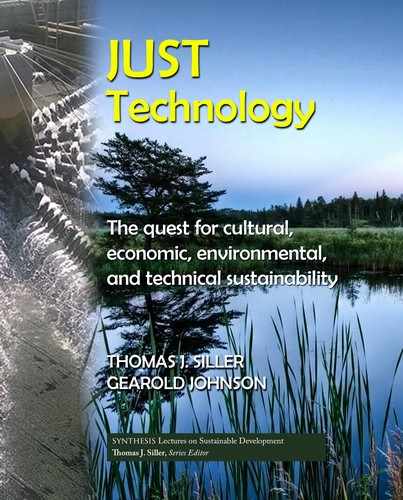
69
C H A P T E R 10
Conclusions
We have now reached the end of our treatise. Let’s review our goals for this book: to get everyone
involved to look more carefully at why we are using technology, to encourage consideration of
possible non-technology or low technology-based alternatives, and encourage deeper reflection
about the potential impacts of our technical choices? We started by acknowledging that the great
challenges we face will require technology, but they will also require social/cultural, environmen-
tal, and economic changes to be woven together into interdisciplinary approaches. To encourage
this type of broad-based thinking we provide a framework that assists us in asking important
questions before committing to particular approaches to address the serious challenges society
faces. Just like Baillie and Catalano [6] focused on decision making, so do we. e decision to
use a technological solution to all of the challenges in society has become all too common with-
out enough reflection. In this book we developed a framework for reflection that we believe can
lead to the more just use of technology.
10.1 IS TECHNOLOGY NECESSARY?
As we stated above, our goal is not to stop the use of technology; we are not contemporary
luddites! e quote from Perrow [92] below captures this philosophy perfectly—no one really
can be anti-technology.
“One can no more be antitechological than they can be anticultural or antinature; the hoe
and the wheel and cooking meat and baking bread are technologies.”
Technology is an inherently human trait—it is a key to the development of society and
the maintaining of our society. But technology should not be used too casually either—there
are important considerations to be made when choosing to implement technology. e Just
War philosophy was developed to try to prevent war from being used too often to solve issues
that could be resolved in another manner—preferably a more peaceful manner. is has not
stopped the use of war but it has encouraged the use of other solutions, just look at the embargo
approach taken by western countries trying to prevent the proliferation of nuclear weapons to
new countries—a case where some advocated military intervention! So, political challenges can
be addressed using alternatives to traditional, or nontraditional, warfare. Similarly, technology
is not always the just approach to addressing current challenges such as climate change. Slowing
the influx of greenhouse gases into the atmosphere will require real cultural change. We will not
be successful in this effort solely by designing more efficient automobiles; we must also reduce the
..................Content has been hidden....................
You can't read the all page of ebook, please click here login for view all page.
